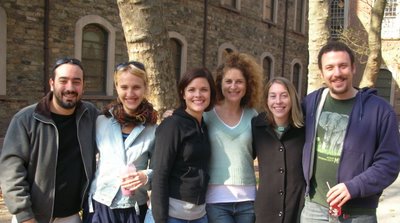

Valerie Chu writes about the catalyst for her interest in Art Therapy: Rwanda.
This past summer, I spent 9 weeks in Rwanda doing art therapy work. It was actually my third time in Rwanda, but this past trip was the first time I brought my newly-acquired art therapy knowledge with me. I worked with a Christian missions and development organization called Youth With A Mission (YWAM), which conducts work in many different countries around the world. I had the opportunity to run groups for young adults who were orphaned from genocide, children infected or affected by HIV, children in primary school, prostitutes, as well as staff. As there were little to no art materials available there, I had to bring everything I was going to use for the 9 weeks in 2 cardboard boxes.
Why Rwanda?
Four years ago, I made my first foray into Africa. After living in Tanzania for 3 months, the subsequent summers I have returned to visit other East African countries. Rwanda quickly made a lasting impression upon me. The vibrant culture, along with the vitality of the Rwandese people impacted me. But just as strongly, their long and tragic history that led to the 1994 genocide, compounded by the betrayal of international indolence in their time of need, broke my heart. While the country is currently stable, its society and people still carry with them scars from the genocide. Not only indelible physical scars on bodies, but deep psychological scars from being confronted with horrific trauma, continued poverty and deprivation, soaring unemployment rates, a crippling HIV/AIDS epidemic…it is not hard to imagine the emotional needs that are present.
Rwanda actually served as a catalyst in my decision to pursue art therapy in the first place. I am particularly interested in how art therapy can be shared abroad in cross-cultural settings. Certainly people in different cultures have already naturally tapped into creativity as an expressive outlet, but there may not be accompanying awareness on how the therapeutic aspect functions specifically or a framework for deeper understanding.
Attempting Cross Cultural Art Therapy
In spite of growing emphasis on cross-cultural art therapy, the field as it has developed thus far, is primarily a product of the Western world especially since the majority of literature and theories have been developed in the West. Whether we like to admit it or not, I believe that bringing art therapy-- as we currently understand it-- across cultures is a process fraught with difficulty.
In the present day Rwandese culture, the concepts of counseling, therapy and mental health are often not well understood or accepted. Fine arts also appear not to be a field particularly valued or respected. Furthermore, the Rwandese are quite reserved when matters of personal feelings and emotions are broached; they appear to be less culturally disposed towards self disclosure or external emotional expression. Many people, aside from having sustained serious emotional trauma, continue to struggle with immense physical and material deprivation. In light of this, trying to effectively introduce art therapy and utilize it in a beneficial way required traversing vast cultural, economic and social divides. In many ways, I was not entirely prepared for those challenges. While I knew what I was potentially up against, in all honesty I was armed with optimism and faith more than actual expertise or experience. But I certainly learned an immense amount through the process of doing!
While I am still processing my work there, I do believe art therapy has helped those that I shared it with. Even in a culture that does not seem to celebrate personal emotional expression, I believe that traumatized individuals have found relief in sharing their own narratives and feelings, at their own pace, in an accepting setting. It also gave them an opportunity to find support from and commonality with others who have had similar traumatic experiences. Many Rwandese have surprised me with their resilience amidst struggles-- how they have drawn strength from their faith, deep inner personal resources, as well as from others around them. In spite of tremendous hurts, there has been incredible restoration and such potential for more.
There is still so much that I need to examine from my experience, especially in terms of evaluating my own paradigm of doing art therapy and suitability for the Rwandese culture. I think there are a lot of adjustments that I need to make in order to better serve the people there. I am planning to return in summer 2007 if circumstances allow, and hopefully I will go there with more experience and insight.




